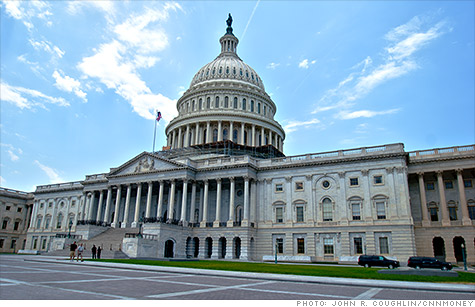Search News

Of 15 economists surveyed by CNNMoney, nine support extending the Bush-era tax cuts.
NEW YORK (CNNMoney) -- Economists want to see the Bush-era tax cuts extended, but are split on whether President Obama's proposal is the way to give the economy the biggest boost.
In a CNNMoney survey that asked 15 economists to rank the impact of moves Congress could make to help the U.S. economy, nine endorsed some kind of extension of the Bush tax cuts.
But five of the economists wanted to extend the tax cuts for all taxpayers, while four endorsed the Obama administration's call to extend the cuts for all but those in the upper income tax bracket.
Carl Riccadonna, senior U.S. economist with Deutsche Bank, said the most important thing to do is to not re-impose any of the taxes when economic growth and hiring are still so weak. He supports extending the Bush tax cuts for all, since the only way to win Republican support for the extensions is to include the break for the upper-income taxpayers.
"By pushing an extension for one group of taxpayers and not the other, you reduce the possibility of it being passed," Riccadonna said. "We don't need to raise taxes in the short term. When unemployment is down to 6%, we can talk about phasing out these tax cuts, even though that could be a while."
Russell Price, senior economist with Ameriprise Financial Services, is one of those who agrees with the Obama administration proposal, saying it balances the need to deal with deficits while at the same time keeping most of the stimulus in place.
"We do need more revenue into the government, but you've got to try to do that with the least economic harm," he said. "There will be a very modest negative impact (of raising top tax rates) but it's not as significant as some people would lead us to believe."
The other tax cut due to expire, a partial holiday of the payroll tax, had far less support among economists, with no one saying it was the best way to help the economy and only two ranking it as their second-best option.
The expiration of the Bush tax cuts and the payroll tax, coupled with mandated cuts in federal spending spelled out in last year's deal on raising the debt ceiling, are known as the "fiscal cliff" and have become a major worry for economists.
Eight of 23 economists surveyed say it is the greatest threat facing the U.S. economy, placing it second behind the 11 who are most worried about the impact of the European sovereign debt crisis.
While the extending the payroll tax has relatively limited support, economists were far more supportive of the idea of a broad based tax reform, which would lower most tax rates but eliminate many deductions and breaks now in the tax code.
Three of the 15 economists who ranked various choices picked tax reform as their top choice to help the economy, and another four did not rank the full range of options but tapped tax reform as best option.
"A credible deficit reduction plan with tax and spending reforms would be most helpful," said David Nice, an associate economist with Mesirow Financial.
But while some economists still hope there might be a deal struck to extend the tax cuts before the fiscal cliff is reached, it is virtually a political impossibility there could be any comprehensive tax reform passed during this election year.
"That's off the table of what is going to happen this year," said Riccadonna. ![]()
| Overnight Avg Rate | Latest | Change | Last Week |
|---|---|---|---|
| 30 yr fixed | 3.80% | 3.88% | |
| 15 yr fixed | 3.20% | 3.23% | |
| 5/1 ARM | 3.84% | 3.88% | |
| 30 yr refi | 3.82% | 3.93% | |
| 15 yr refi | 3.20% | 3.23% |
Today's featured rates:
| Latest Report | Next Update |
|---|---|
| Home prices | Aug 28 |
| Consumer confidence | Aug 28 |
| GDP | Aug 29 |
| Manufacturing (ISM) | Sept 4 |
| Jobs | Sept 7 |
| Inflation (CPI) | Sept 14 |
| Retail sales | Sept 14 |